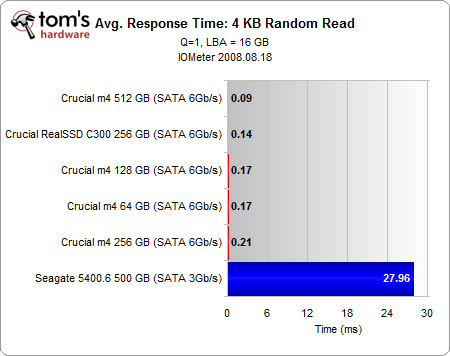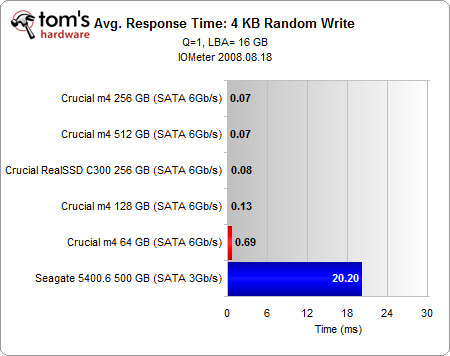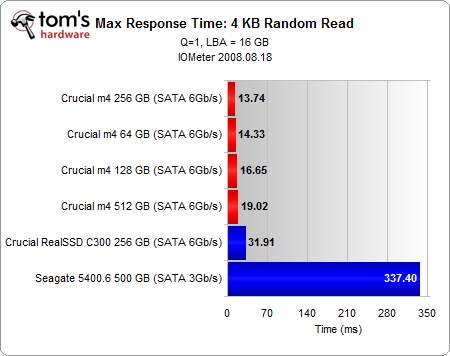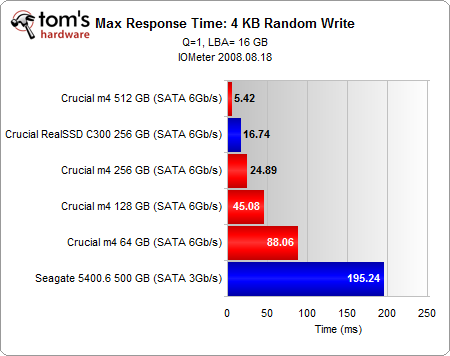Crucial's m4 SSD Tested At 64, 128, 256, And 512 GB
4 KB Random Performance: Response Time
We're trying to dig right into the benchmark analysis, which means skipping over some of the explanation given in the past for the data we're presenting. Again, if you missed any of that before, flip over to page seven of Second-Gen SandForce: Seven 120 GB SSDs Rounded Up.
Again we see the m4s finish in the order we'd expect. However, the margins between read response times are sufficiently small that they shouldn't affect performance, unless you're talking about reading lots of data.
The observed write response time is another matter. The 64 GB m4 has a response time of 0.69 ms. That's 5x slower than the 128 GB m4, which in turn is only 85% slower than the 512 and 256 GB m4s. In the case of the 64 GB m4, not only are you writing data 5x slower than the 128 GB m4, you're also taking 5x as long to finish a write op.
Response time is a measure of the difference between initiating and completing an operation, while throughput is a measure of the amount of data transferred. These two values affect performance in different ways, but they're not multiplicative. So, it's not like the 64 GB drive feels 25x slower than the 128 GB drive. Throughput and response time are usually correlated, in that you get high throughput with low response time.
The maximum response time gives us a look at the extremes. In random reads, the SKUs we're testing fall in the reverse order this time, again with the exception of the 256 GB m4. Of the SSDs, Crucial's C300 actually performs the worst, suggesting a generational improvement.
Drives with more capacity deliver a lower maximum write response time. The 512 GB m4's response time is about 16x lower than the 64 GB model. However, even the entry-level drive is more than twice as responsive as our hard drive (Seagate's 5400.6 has a max write response time of 195.24 ms).
The different max write response times are reflective of the role hardware and firmware play in performance. The firmware in the 256 GB and 512 GB m4 doesn't wait for a back-to-back 4 KB write operation in order to put two 4 KB chunks into one 8 KB page. Every random write operation automatically goes to a separate page. That's why the 512 GB m4 tops the chart, as it has more dies per channel to better leverage simultaneous write operations. And with half the number of dies per channel, the 256 GB m4 falls behind. However, the 128 GB m4 is like the 256 GB m4, because both have four dies per channel. This is where firmware comes into play. The artificially-capped firmware in the 128 GB m4 restricts performance in order to provide better product differentiation. If it wasn't capped, the 128 GB m4 should have a similar max response time to the 256 GB m4.
Get Tom's Hardware's best news and in-depth reviews, straight to your inbox.
Current page: 4 KB Random Performance: Response Time
Prev Page 4 KB Random Performance: Throughput Next Page 128 KB Sequential Performance-
wintermint I've been recommending the Crucial m4 128gb to people, and after seeing this.. I'm glad I did :]Reply -
sceen311 it'd be nice if they threw a 7200 rpm hardrive on the bench... We don't all have laptops ya know.Reply -
compton I'm glad this was done. It's rare that you get the chance to stack all the capacity points up (as in never). I bought an Intel 510 120GB and a M4 64GB and my own testing showed that you'd never know the difference besides the capacity (in day to day use, besides lower max write MB/S). I kinda like keeping my system drive to a bare minimum -- just Win7 no swap or hibernate, Office, a few other apps, and then I keep my Steam folder on a separate drive. Simple. I will say that if you are building a new system, cut whatever you have to in order to fit at least a 64GB SSD -- the M4 is excellent at any capacity. I'd rather have to go down to an i3 from a 2500k than from a SSD to a HDD. I get tired of people saying "it's not worth it" and "they're not much faster than a 7200rpm". Those people must be doing it wrong.Reply -
beenthere Now if they could only make these SSDs reliable, we could all enjoy some performance improvement. Intel, Micron, OCZ and Corsair to name a few have all had reliability/compatibility/firmware issues of some sort resulting in loss of data, which for me is simply unacceptable.Reply -
Last month I got a 64GB for my laptop and a 128GB m4 for my desktop. So far no issues, and the speed is great. Glad I got the 128GB and not the 256GB.Reply
-
PCMark 7 Storage tests are just pathetic, they have messed some of them up on purpose it seems just to shrink the difference between systems containing SSD and the ones containing HDD only, useless bench from start to "finish"...Reply
-
mroanhaus I picked up the 64 GB M4 two weeks ago on Newegg for under $90. I am so glad I bought it, the thing makes boot times lightning fast. I have Win7 64-bit, Photoshop, 3DS Max, Google Chrome, and a few little monitoring and Bitcoin mining apps on there and I STILL have 21 GB to spare. Don't buy the 128 GB unless you really need it, throwing Steam and other massive apps will be much better suited on a secondary HDD. SSDs are simply amazing and well worth the money spent, even if you're a cheapass like me they're still affordable. The time saved from having to wait around while booting your computer makes SSDs worth the money imoReply -
burnley14 ReplySee how they all hover pretty close to the same price per gigabyte, while sequential write and random write performance trend upward? Those are the spoils available to folks willing to spend more on higher capacities.
This is true, but in 6 months when the whole lineup is outdated and the next generation of drives blows these ones away, those that spent more are going to have spent the extra money without much purpose. -
cknobman burnley14This is true, but in 6 months when the whole lineup is outdated and the next generation of drives blows these ones away, those that spent more are going to have spent the extra money without much purpose.Reply
Well going by your logic why should anyone ever spend money on anything in technology??? Guess its always a waste huh?
Failed logic.



